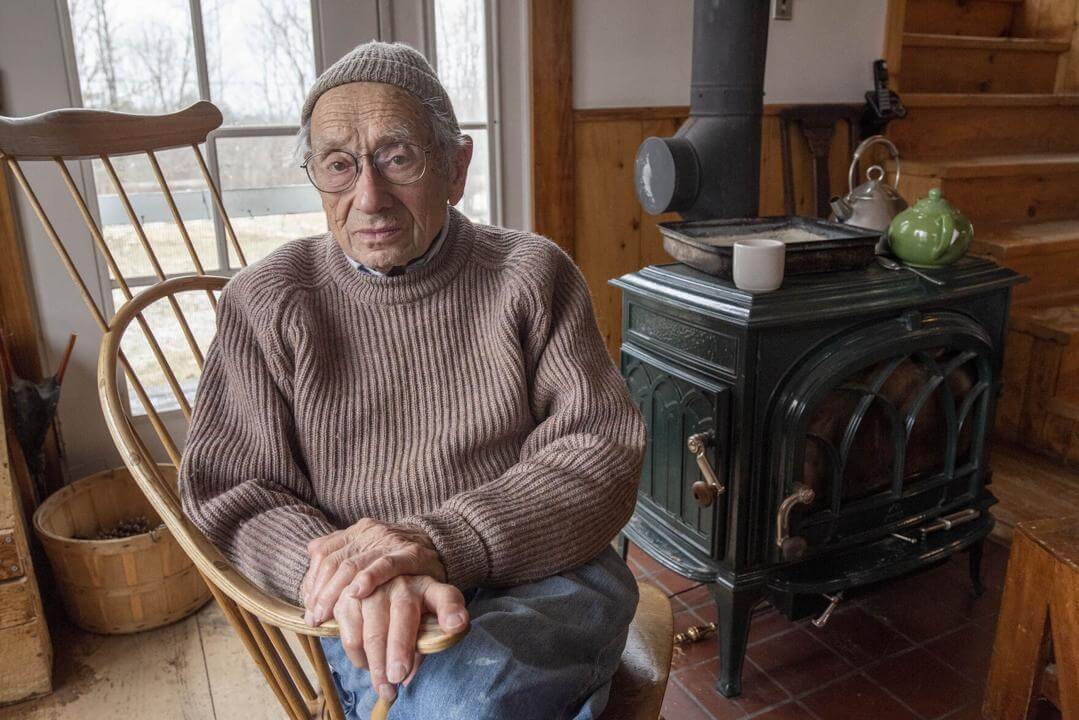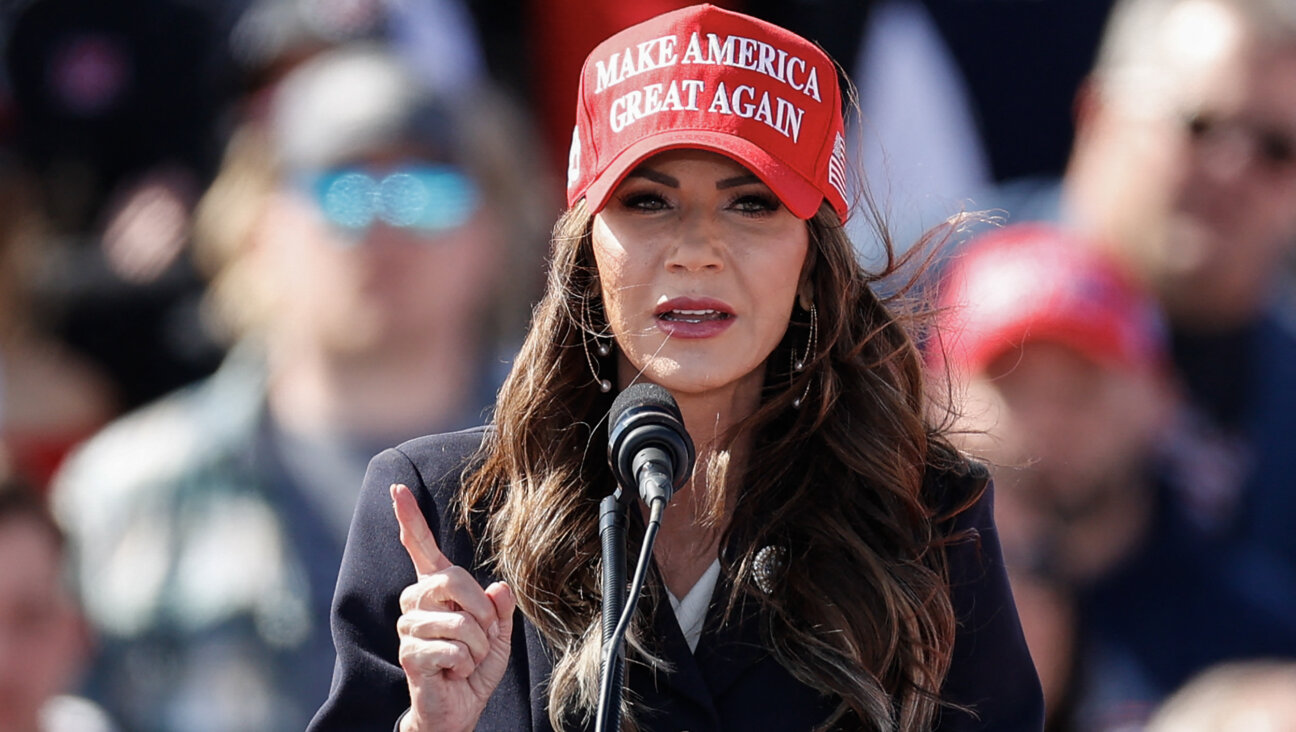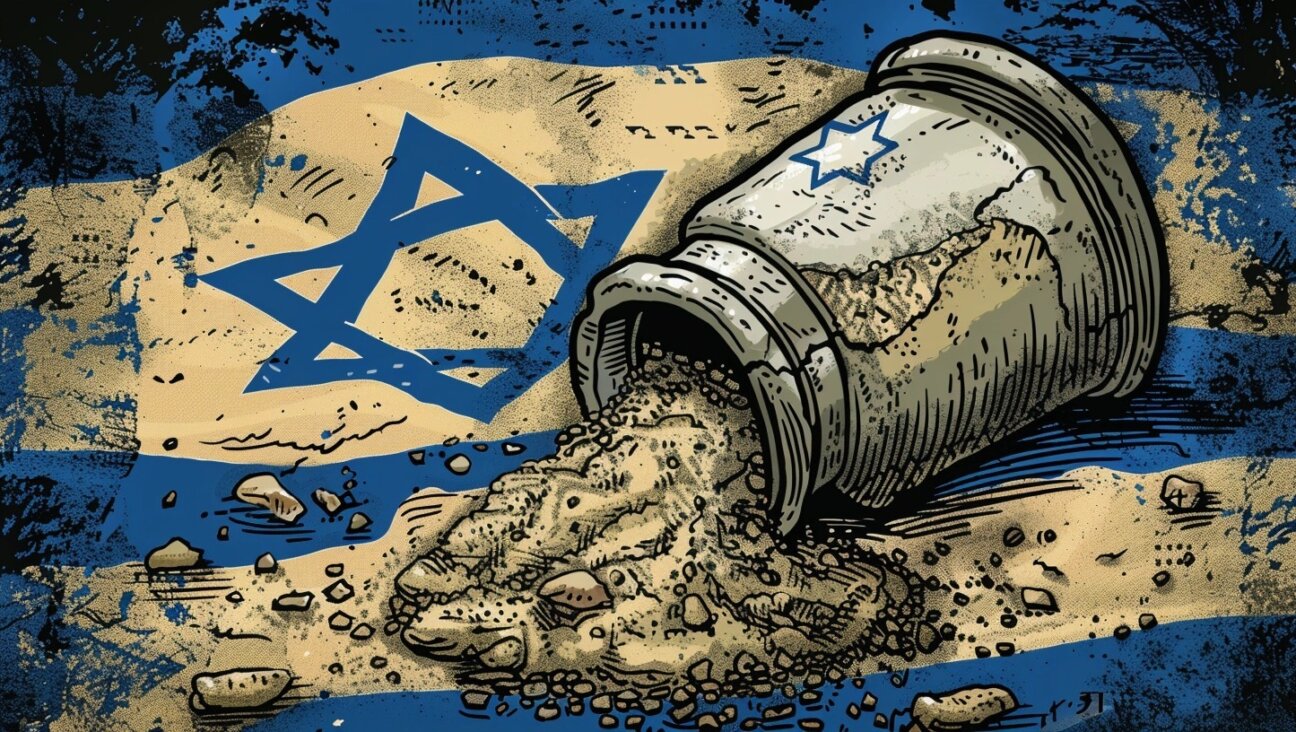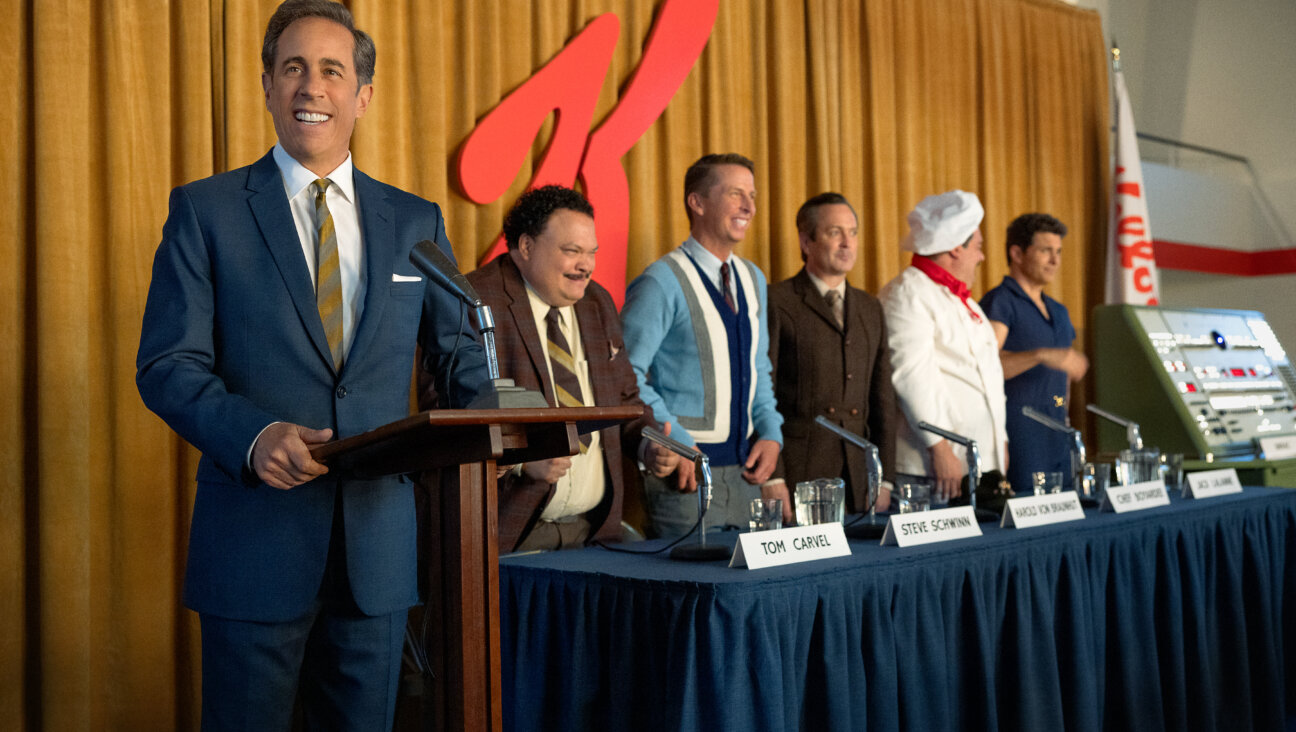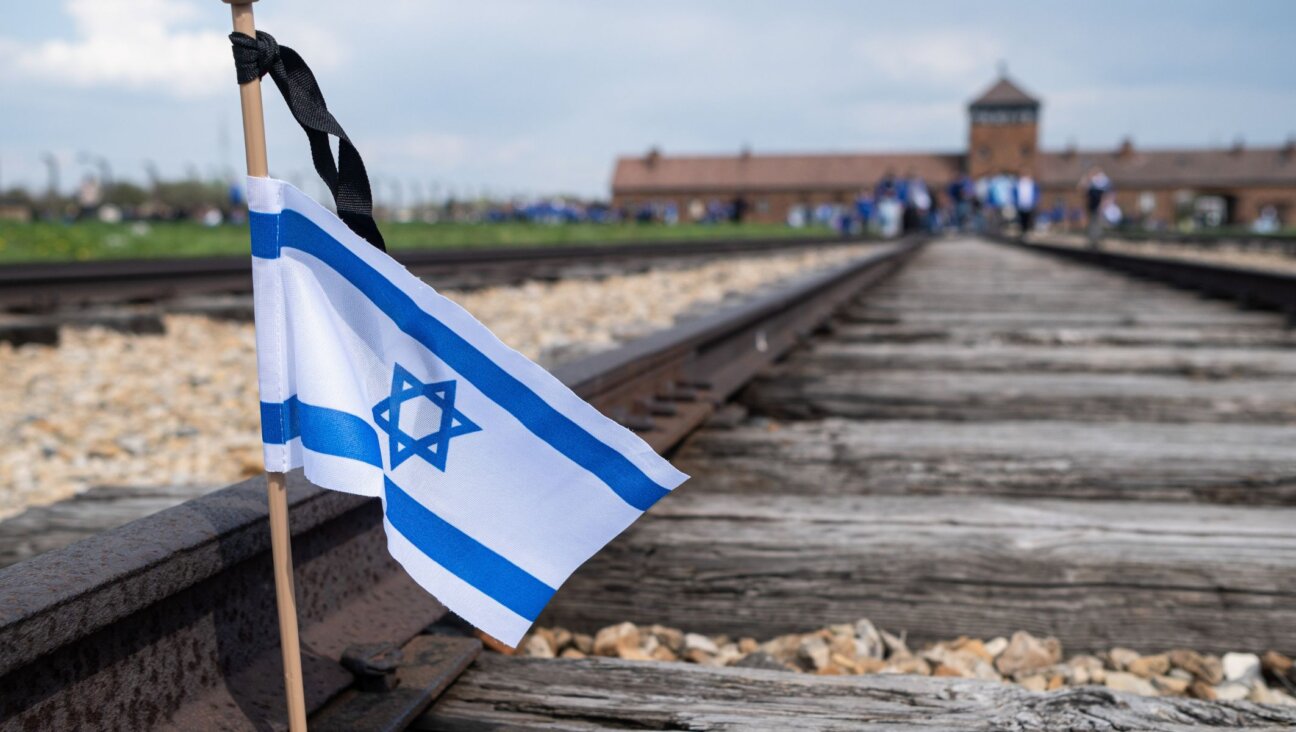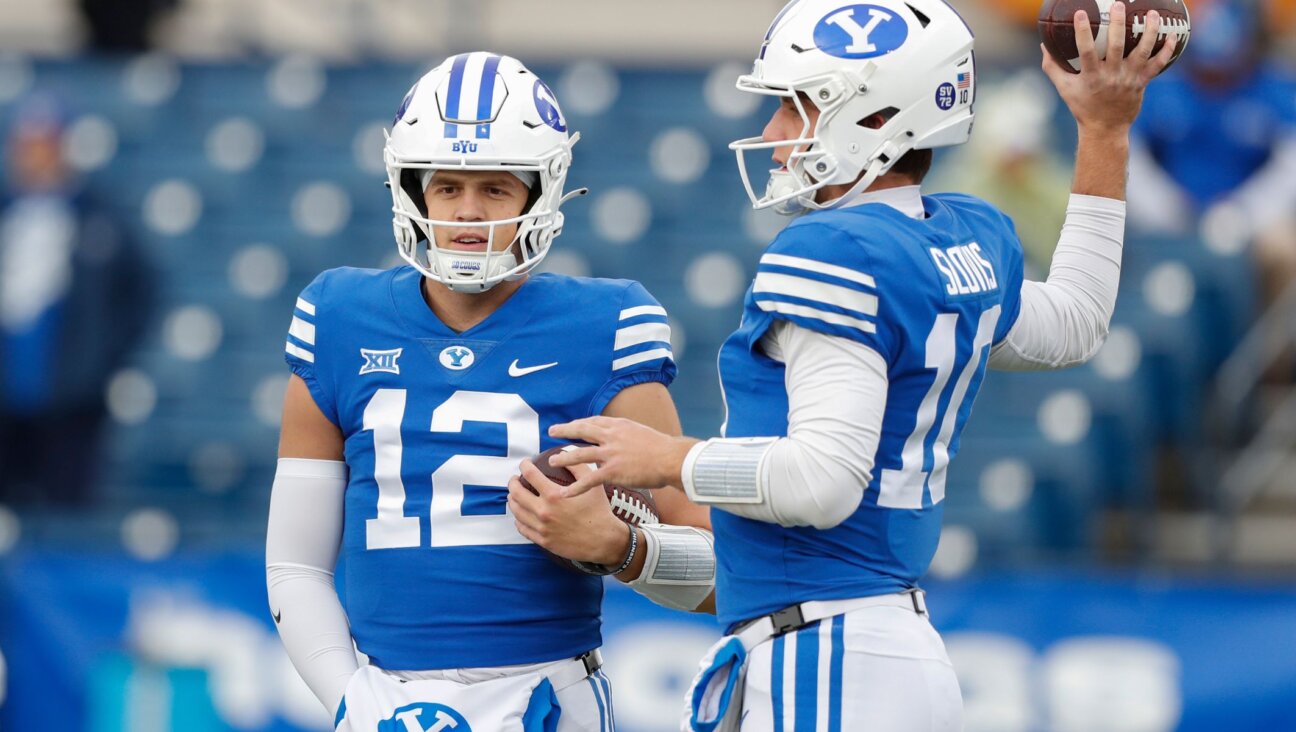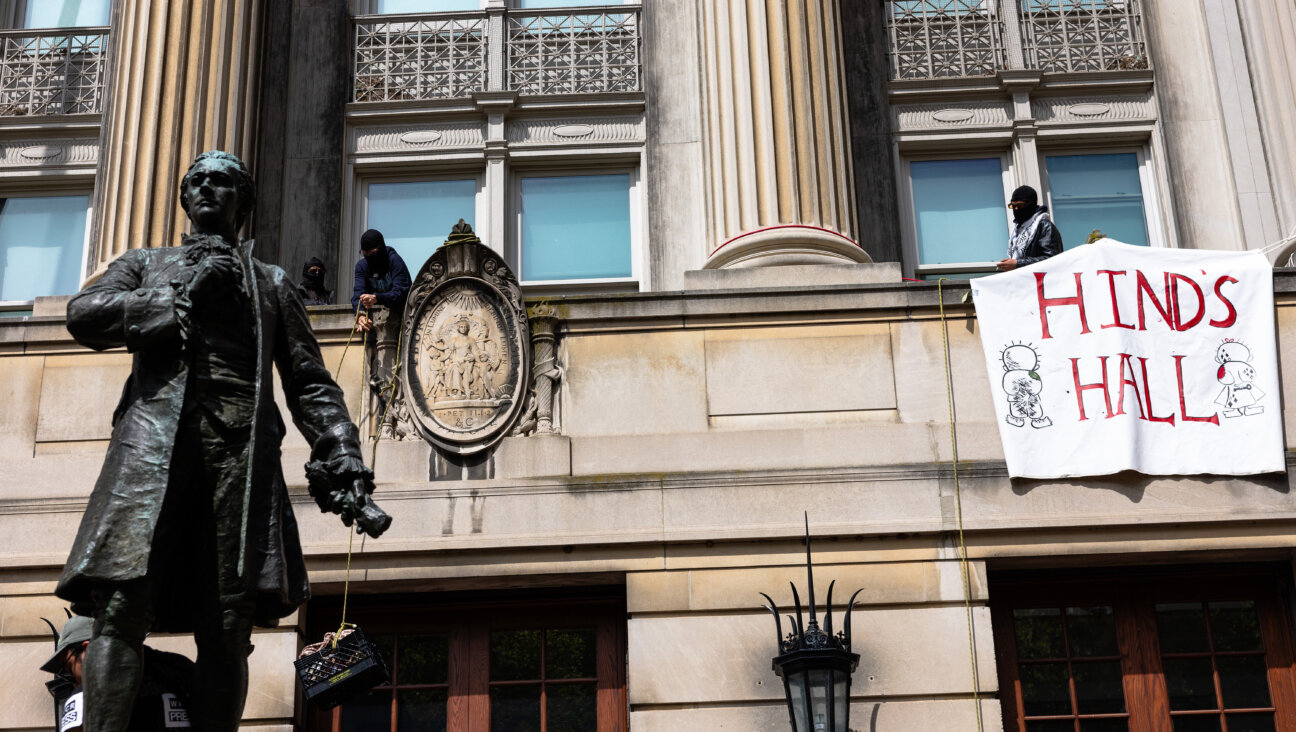The year that I’ll remember, the year my grandfather won’t

The author’s grandfather as a boy: There was a time when Grandpa’s memory stretched back to pre-war Europe, to wooden houses and crowded tables at Passover seders, where the men wore tall hats and the women long skirts. Courtesy of Jackie Schechter
Around this time last year, I held my grandpa’s hand in the ER of a New York City hospital. Half-drawn curtains formed alcoves that revealed slivers of the patients nearby — faces, an arm. I looked from one to the other. They were alone. They seemed to be asleep. They were hooked up to machines much like the ventilators I’d seen in articles online.
Grandpa hadn’t lost his sense of smell, or taste, or breath. He tugged at his mask until it settled beneath his chin. It was a homemade mask, thin yellow cloth and thick elastic bands, and I thought, stomach sinking: there’s no way this will help. COVID was floating in the air, settling on our skin and in our lungs. I pushed the mask back up. “Remember, Grandpa, the virus? This needs to cover your nose.”
He shrugged and asked again what was going on, which he had asked in the apartment and in the ambulance. I told him he’d dislocated his hip, that he’d had a fall, and he told me his hip felt fine. It wasn’t. I’d seen the X-ray and it was easy to read — femurs should end in sockets, but his was off to the side, untethered. Either Grandpa had an incredible tolerance for pain or this was another malfunctioning of his mind, a neuron firing into the abyss.
For the past five weeks, he and my grandma had quarantined in their apartment with my sister, who cared for them while we dropped off groceries by the door. Still, we’d ended up here. My eyes watered.
I don’t know if those other patients made it home to their families. We were lucky, and Grandpa did. He returned in a wheelchair and to a hospital bed, the kind with guardrails, sitting in the living room, and which my grandma had made with the blue and white sheets from my childhood. “Your mom brought them,” she explained. “I didn’t have anything twin-sized.”
We counted 14 days until the specter of the virus passed, and we exhaled.
Yet Grandpa wasn’t the same; neither was the world, and he could sense it. “Everything is upside down,” he said. Around 5 pm, like clockwork, he’d beg anyone within earshot to take him home — “please, let’s just go home” — as he sat in his apartment filled with pictures of his kids and grandkids. He’d mutter about papers, about leaving and packing and his parents. He’d scrunch his eyes and ask for a blanket, and we’d bundle him up though it was nearly summer. Home, he’d repeat. Go. Let’s go.
After these attacks, Grandpa would gush apologies or thanks. He’d sing nonsense songs in Yiddish. I am home! He’d laugh. It’s okay! He’d eat bowls of ice cream with gusto.
It’s been difficult for most of us to process this pandemic, its suffering and strangeness and loss. For my grandfather, it’s one confusion layered atop another. “I feel like I’m trapped in a dark closet,” he told my mom last spring. I imagine the weight of that door, how surely it creaks shut.

The Old Country: There was a time when Grandpa’s memory stretched back to pre-war Europe, to wooden houses and crowded tables at Passover seders, where the men wore tall hats and the women long skirts. Courtesy of Jackie Schechter
There was a time when Grandpa’s memory stretched back to pre-war Europe, to wooden houses and crowded tables at Passover seders, where the men wore tall hats and the women long skirts.
When Grandpa was five, his father Martin saw the writing on the wall for the Jews of Europe. He made a plan to go first and send for Tanya and their son later, but they were living with Martin’s parents at the time, and Tanya said, “You’re not leaving me with them.” So they all boarded the boat — Martin, Tanya, and young Herman. It was October 1938.
Grandpa never saw his own grandparents after that. They were shot alongside the 12,000 Jews of Baranovich. His surviving relatives scattered — running, fighting in the forest, fleeing to America and to Israel.
Baranovich still exists — it’s in Belarus now — and I’ve been there. Four summers ago, my mom scanned for her maiden name, Kroshinsky, on a dusty map in the town archive, and we drove to Grandpa’s childhood address, which has since become a firehouse. We visited the cemetery, the Jewish one, grassy and overgrown. Quiet.
At the end of the trip, we brought Grandpa home a magnet: I ♥ Baranovich, to match the I ♥ NY t-shirts he stocked for out-of-town guests. He laughed and stuck it on the fridge.
Grandpa started kindergarten in Brooklyn, where he learned English and played streetball. He was never much of a student, but the army — basic training in Arkansas and deployment in France, in the lull between Korea and Vietnam — gave him an education, and he traveled on the weekends, visited the Louvre and took pictures of archways and coastlines that he developed back on base. Somewhere, though I don’t know where it’s gone, we have a black-and-white photo of him sitting on the hood of a car in a forest in France, drinking a beer.

Boyhood memory: They all boarded the boat — Martin, Tanya, and young Herman. It was October 1938. Courtesy of Jackie Schechter
At 26, he met my grandma through work. She was so out of his league — a year older and living on her own, with two degrees and a worldly, knowing air. But they were both immigrants and Holocaust refugees, and they’d both attended Erasmus Hall High School on Flatbush Ave. He would take her for ice cream — strictly professional — and then walk her back to her office. When he finally asked her out, she said no, and when he asked again, she said no again. Enough of the ice cream, he decided.
Then fate landed them both in the Catskills for the 4th of July. My grandma’s car broke down on the way up, and when she arrived at the hotel, bedraggled and exhausted, his familiar face was there, waiting in the lobby. She fell, crying, into his arms, and they’ve been together 62 years.
When I was a kid, Grandma and Grandpa would visit us on Sunday mornings, loaded with steam-wilted bags from Pick-A-Bagel. My sisters and I would run to the door, the hallway cold on our feet, and Grandpa would put down the bags and sweep us up.
Even better were the times we drove from the suburbs to see our grandparents in the city, where we ordered shoestring fries at Googie’s Luncheonette. Sometimes we accompanied Grandpa to his volunteer shift in Central Park, passing maps through the window of the information booth. As I grew older, Grandpa would save me newspaper articles, ones he thought I’d find interesting, handed over in manila envelopes, clippings annotated in his blocky, all-caps scrawl. “It’s a big world out there,” he used to say.
Last summer, COVID and Alzheimer’s conspiring, that world started to shrink. Grandpa watched hours of Mets’ reruns without realizing the games were decades old. Over breakfast he flipped through the newspaper, sometimes so fast it was impossible he was reading, other times so slowly it was as if he’d forgotten what he held entirely. He took endless laps around the block once his hip healed, enough to shred the runners on his walker.
Our family scrubbed our hands and continued to visit when needed, which was often. COVID was a threat, but so was falling, and forgetting. So was loneliness. It felt essential to show up when Grandpa asked again and again: “Who’s coming tonight for dinner?”
Over the years, I’d eaten dozens of meals at my grandparents’ table, when I moved to New York after college and decorated my apartment with those photographs of archways and coastlines. Grandma would make sweet-and-sour meatballs and salad with dijon dressing. Grandpa would wash the dishes and ask me questions like: Are you thinking about law school? Are you dating? What’s going on in your little life?

A Day in the Park: Grandpa had a noise the way most people have a smell. He’d search for pennies and dimes embedded in the asphalt from years of traffic and hot summer days, coins that had become fossils of the city. When he noticed one, say, at a crosswalk, he’d mark the location and return with a pocketknife to dig it up on the day of a street fair. He’d soak the coins in Coca-Cola to remove the tar, and that’s when the sound began — the constant clinking of change in his pocket. Courtesy of Jackie Schechter
One dinner last summer Grandma gnawed on a turkey leg with her characteristic fervor, slicking meat from the bone, and it was like Grandpa was seeing it for the first time. “My God, Fran!” he exclaimed, and we all laughed.
She shrugged. “Don’t look.”
Sometimes he’d wake in the night and she’d sit next to his bed, holding his hand across the guardrail until 5:30 in the morning.
Grandpa had a noise the way most people have a smell. He’d search for pennies and dimes embedded in the asphalt from years of traffic and hot summer days, coins that had become fossils of the city. When he noticed one, say, at a crosswalk, he’d mark the location and return with a pocketknife to dig it up on the day of a street fair. He’d soak the coins in Coca-Cola to remove the tar, and that’s when the sound began — the constant clinking of change in his pocket.
This winter, he fidgeted with children’s toys instead, unbuckling buckles, unsnapping snaps. He pulled invisible threads between his fingers and twisted batons of rolled-up newspaper. He was hallucinating; he was agitated. A hollow formed between his cheekbones and his chin. We ordered takeout and offered him a battered french fry, and he tried to put it in his shirt pocket, like it was a pen. One week he grew feverish and needed a COVID test. We explained the process, but he still thrashed in his chair. He bit the nurse’s hand. She jumped and got the sample and held up her prize, then told us she needed the other nostril, too.
On the first night of Hanukkah, I visited around dusk. Miriam, my mom, would stop by later. Grandpa sat at the kitchen table, shaking and staring at a napkin in front of him on which his aide Ryan had written: we are home. I pulled up a chair and pointed to the words alongside Ryan. “We are home. We are home.” We read it like a mantra.
After he quieted, we lit the candles and had dinner. Grandpa didn’t know where he sat or who I was, but he held out his fork and asked if I wanted something to eat, and he took Ryan’s hand and said “I love you.” Ryan was sitting in Grandma’s usual spot. With the world closing in, Grandpa did what he still knew: to care for others, to reach out for her.
At the end of the night, the napkin said three things in large letters:
We are home.
Miriam is coming.
Herman Kroshinsky.
Grandpa got his shot in January. After months of sanitizing and a few close calls — in November, I stood in line at CityMD after an exposure, voice breaking as I spelled Kroshinsky for the contact tracer — we were in a world that once felt beyond belief: Our grandparents were vaccinated.
Grandpa used to ask me why we wore masks — on a good day, every 20 minutes, on a bad day, every two. As I re-explained the virus, his old questions, direct and heartfelt, would ring in my head: What’s going on in your little life? (To that question, which he asked all his grandchildren, we’d respond: It’s not so little anymore!).
But by the time he got the vaccine, he barely registered the mask, or the person wearing it. You could put yourself inches from his face and his eyes would flit around, aimless and unseeing. In some ways, it was too late. The shot couldn’t save him.
On a cold night in February I walked around my neighborhood as it flurried. About a block from my apartment, I came across a bedside commode abandoned on the sidewalk, next to a pile of trash. I thought of the commode sitting beside my grandpa’s bed, and I looked at this one covered in the snow, and I wondered about the person for whom it was no longer needed.
In a year of untold, unforeseen tragedy, this story is a different sort. This is what happens when you’re 87, if you’re fortunate enough to make it this far. It’ll keep going, my mom often says, and it only goes in one direction.
Until it doesn’t. Something changes in the spring, and a good day turns into a week that turns into three. Grandpa jabbers like he’s had too much sugar, with raised eyebrows and a smile that consumes his whole face. He hugs us back and will grab anyone’s hand to kiss it.
He starts folding the newspaper. He lines up the edges and creases the fold with a confident hand, pressing his fingers against the seam to rip the paper into neat halves. He puts these squares in his shirt pocket, like they belong to the weathered address book he used to store there. One day he reads the word “vaccination” in a headline, though he doesn’t know about the vaccine, or that he’s had one.
We sit around the table watching him, and I imagine it’s how I’ll one day watch my own children, marveling at the ways they enter this big world. With Grandpa, instead, we’re seeking proof he hasn’t left it. We toss him a hacky sack, which he catches. He reads more headlines. We delight. “Oh, hello there,” he grins at us. “Can my day get any better?”

Grandfather on Passover, 2021: He knows that word, dayenu. There’s something within him that remembers, something more fundamental than faces or time or even his own name. His voice is soft but fills the room; we’re all listening for it. Courtesy of Jackie Schechter
Each year on Passover, Grandpa would gather the grandchildren for a photo before the seder. We’d have spent the day at my cousins’ house, running around and plotting how we would steal the afikomen and hide it for Grandpa to find, our family’s twist on the tradition. As the afternoon faded we’d clean up and emerge in nice clothes, the golden hour air fresh with the newness of spring. Those pre-seder photos— 11 dressed-up, bright-eyed schoolkids — paper the walls of my grandparents’ apartment alongside their pictures from the old country.
This year some of us are in person, most of us over Zoom. Between the internet lag and our tone-deaf family, it sounds like we’re singing in rounds — badly. There are lots of giggles at the absurdity of it all.
Grandpa used to call on us between the verses of “Dayenu,” the song that recounts the steps God took to free the Jews from slavery and bring them to Israel. Each step alone would have been enough, the song notes, but God did more. At our family’s seder, the person Grandpa named would shout “dayenu!” and then we’d all continue singing.
This year, my aunt does the calling from her dining room table in Chicago. We have Zoom boxes in four states and two countries. That we can all be here together — it would have been enough. That Grandma and Grandpa escaped Europe, eluded the virus — enough.
But there’s more: Grandpa’s singing. He’s clasped his hands together, his face deep in concentration. He knows that word, dayenu. There’s something within him that remembers, something more fundamental than faces or time or even his own name. His voice is soft but fills the room; we’re all listening for it.
At the end he looks around. “Nice job, folks,” he says.
With or without COVID, we still would’ve gotten here, and we know, ultimately, where it’s going. But for now, these smiles, his singing — it’s enough. He’s come back to us, a turn of events astounding as a vaccine.
When, in some distant future, we look back on COVID-19, these things will all be one in my memory — the year that starts in the emergency room and ends at the Zoom seder, the year of the pandemic, the year that Grandpa forgets.
Last month he looked at me and asked, for the first time in a long time, “What’s going on in your life?” I’d like to think he knows it’s not so little anymore.
Jackie Schechter lives in New York City and works in education consulting. She is pursuing an MFA in Creative Writing from CCNY.

I hope you appreciated this article. Before you go, I’d like to ask you to please support the Forward’s award-winning, nonprofit journalism during this critical time.
Now more than ever, American Jews need independent news they can trust, with reporting driven by truth, not ideology. We serve you, not any ideological agenda.
At a time when other newsrooms are closing or cutting back, the Forward has removed its paywall and invested additional resources to report on the ground from Israel and around the U.S. on the impact of the war, rising antisemitism and the protests on college campuses.
Readers like you make it all possible. Support our work by becoming a Forward Member and connect with our journalism and your community.
Make a gift of any size and become a Forward member today. You’ll support our mission to tell the American Jewish story fully and fairly.
— Rachel Fishman Feddersen, Publisher and CEO
Join our mission to tell the Jewish story fully and fairly.







